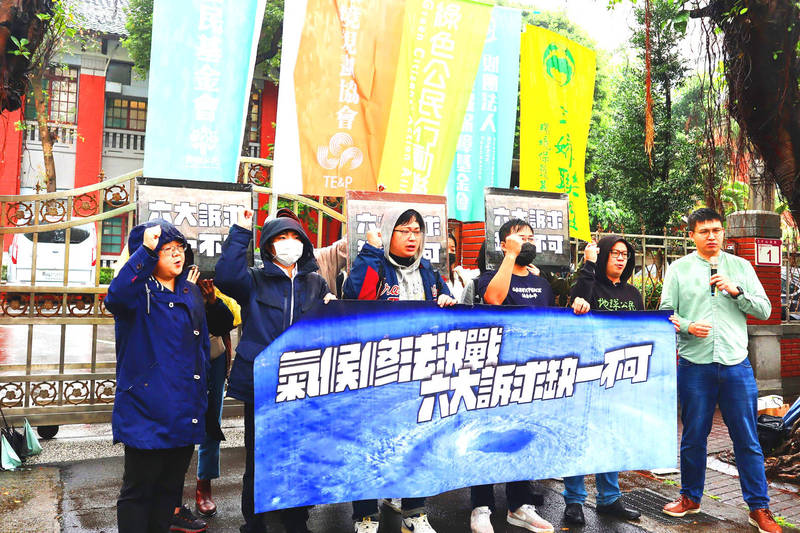Climate advocates rally outside the Legislative Yuan in Taipei yesterday calling for changes to the draft climate change adaptation act. Photo courtesy of the Taiwan Environmental Rights Foundation
INDIGENOUS FOCUS: Their villages are disproportionately affected and need 'climate transitional justice,' a coalition said as cross-party negotiations on the bill are starting
By Jason Pan / Staff reporter
Standards for a carbon tax system and protection for indigenous groups should be part of a proposed climate change adaptation act, climate advocates said at the legislature in Taipei yesterday.
Citizen of the Earth, Taiwan executive Tsai Chung-yueh (Cai Zhongyue) told a rally outside the legislature is vital that environmental groups unite, as cross-party negotiations are starting on the bill.
A dedicated government agency should be established to implement policies to deal with climate change more effectively, Tsai said, adding that the entity should set a fair carbon tax, fee and credit scheme while managing programs to reach a target to cut by net greenhouses gas emis 20 percent by 2030.
“Over the past decade, the biggest obstacle has been the central government lacking an overarching body to coordinate climate change programs and reduce emissions,” he said. “It has permitted ministries and agencies not to take on their responsibility while it plays the blame game .”
The Executive Yuan's National Council for Sustainable Development is the highest-level coordinating body for climate change policies, but “it is does not have officials with professional expertise and it has not been effective in coordinating activities, while the council lacks or limits administrative, whi its power to enforce policies,” Tsai said.
The bill should establish a central government authority, and clearly delineate mandates and responsibilities of other government agencies for climate change mitigation, he said.
A glaring omission is that the Ministry of Finance has not been included in the bill, he said.
The ministry must be included, because it must implement greenhouse gas tax programs and a carbon offset credit scheme, he said.
Greenpeace Taiwan Office project manager Hung Sheng-pang (Hong Shengbang) said that the proposed policies lack financial incentives for companies to reduce emissions.
The bill would be ineffective, as it merely says that “setting carbon tax schemes, rates and compliance targets” are the responsibility of government authorities, Hung said.
The carbon tax scheme should be transparent about how funds are distributed, he said, adding that civic groups should be involved to monitor the government.
Concrete compliance targets should be set, as well as a carbon tax of NT$3,000 per tonne, as US$100 per tonne is the international standard, he said.
Members of the Taiwan Climate Action Network, Green Citizens' Action Alliance, the Homemakers United Foundation and others attended the rally, with speakers calling for the bill to prioritize conservation while meeting the needs of communities.
At a separate news briefing at the legislature, indigenous politicians and rights advocates said their communities are mostly in mountainous or rural areas that are disproportionally affected by climate change.
Members of the Taiwan Indigenous Climate Change Coalition said that the rights of indigenous people should be part of the bill, adding that their communities need “climate transitional justice,” including carbon credit funds to help manage and protect mountains and forests from outside business interest developers.
The bill is a proposal made in 2014 to replace the Greenhouse Gas Reduction and Management Act (Greenhouse Gas Reduction and Management Act).
News source: TAIPEI TIMES
